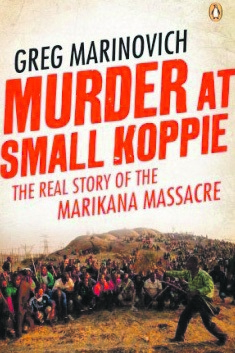
There is no doubt that Bang Bang Club member and Pulitzer Prize-winning photojournalist Greg Marinovich’s account of democratic South Africa’s great tragedy, Marikana, is an important and chilling one.
This book wins because it does not merely tell the story of the 10 days of bloodshed. It also paints a portrait of the real people who still endure unimaginable conditions underground so that a select few can maintain their lavish lifestyles.
Marinovich takes the time to walk the reader through the daily existence of those who put their lives on the line every day, for hours on end, and who can barely afford to meet their basic needs.
A fair disclaimer is that this book is unapologetically from the perspective of the mine workers who downed tools for 40 days in a bid to get their salaries increased.
The tragedy of not just Marikana but most mining towns and the industry as a whole is told from the very beginning – because the tragedy did not simply begin in August 2012. The reader is introduced to the founder of Lonmin, is offered the background to the failure of the unions to protect workers, and is provided with an understanding of the complexity of South African politics and the conflicts that allowed for the environment in which the massacre took place.
The role of Lonmin’s executives in failing to communicate with their workers, who they dismissed as a “faceless” crowd, the incompetence of the police to deal with striking mine workers under the command of an unqualified commander, and the now deputy president Cyril Ramaphosa’s conflict of interest as a major shareholder in Lonmin at the time are all well documented.
However, if you are still trying to wrap your head around the bigger story surrounding the events at Marikana, what led to them and are wondering if they may happen again, this book is for you. It brings together a mass of information and presents it in an understandable way.
The voices that are glaringly missing from the book, however, are those of the families who lost their breadwinners, fathers, brothers and husbands.
A few paragraphs are granted to the widows of the security guards who were killed in the most brutal way, but no face is given to their loved ones.
They, too, form a crucial part of the Marikana story and their loss is in some ways more painful because these survivors have remained largely undocumented by the mainstream media – but their tragedy is no less traumatic and unexpected. The Marikana Commission of Inquiry heard that the security guards, police and National Union of Mineworkers shop stewards – who were killed prior to August 16 – were stabbed and shot, and their body parts cut off for muti. What do their families think about that?
It’s hard to pronounce on whether this book is the “real” Marikana story. I don’t think so. The real story of the massacre will ultimately be told by the surviving mine workers, more specifically those who were in the inner leadership circle. On the day the legal processes have been completed and, perhaps, the Lonmin mine workers themselves have made peace with what happened in 2012, we may then be granted the “real” story.
One thing I took issue with, though, was my occasional uncertainty at how Marinovich came to some of his conclusions. I would have liked him to be clearer on which days he was present at Marikana. On the days he was not there, whose account was he relying on for his information, and what was the bias of those sources? The vagueness surrounding his sourcing of facts is frustrating.
Does this take away from the many hours of interviews and document-scanning Marinovich did? Of course not. The book is, for the most part, an incredible work of storytelling and compelling journalism.
Murder at Small Koppie by Greg Marinovich
Penguin, 272 pages
R219 at takealot.com




 Publications
Publications
 Partners
Partners








